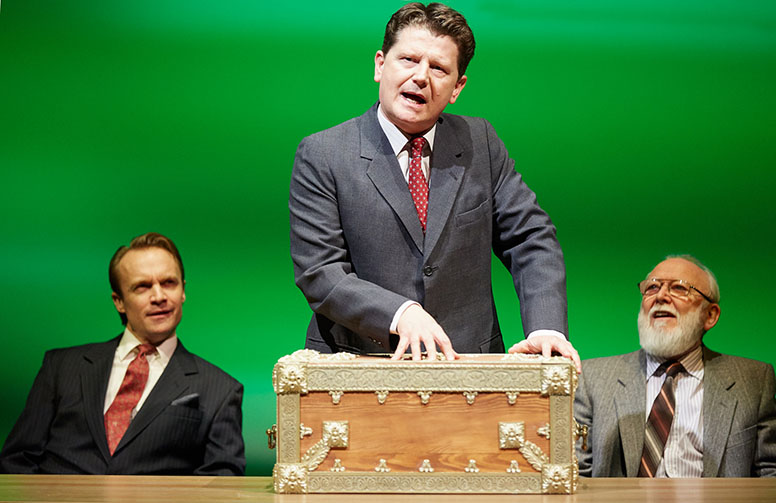It’s now or never for George Jones, the charismatic leader of the Labour Party who needs to get out of opposition and into Number Ten. Plagued by a hostile media, beset by divisions in his party and haunted by his own demons, George has three weeks to convince the Great British Public that he’s their man.
But how much compromise is he willing to make? How can you truly appeal to the man in the street from the House of Commons? And which tie should he wear for Prime Minister’s Questions?
This funny, stinging political drama by David Hare is set against the backdrop of the 1992 General Election. Receiving four star reviews across the board, it is performed by Headlong, the company behind the brilliant 1984, and stars Reece Dinsdale (Coronation Street).
Hare, who has criticised London theatre as becoming de-politicised (“I’ve been dismayed by the lack of political vitality in it,” he argues) is delighted to see the show touring regionally. Director Jeremy Herrin explains why he took it on:
“I was looking for a play with a bit of heft to take around the country during the run-up to the General Election. But because it was too closely identified with Neil Kinnock and Labour’s election campaign in 1992, it didn’t get the credit it deserved and the universality of the story was not fully appreciated. More than twenty years after it was first produced, The Absence of War is still the most accurate analysis of the problems facing the Centre Left in Britain today.”
The play’s title refers to Hare’s contention that a figurative war should be raging at the moment, given the state of British society, and yet the metaphorical guns have fallen eerily silent in what Hare describes as ‘this awful quiescence’.
“I think we only come together at a time of war,” he says, pursuing the analogy. “An army is both totally hierarchical and fundamentally socialist in that everybody depends on everybody else for survival. In a way, the play is a romantic tribute to that strand of the Labour Party, the soldiers who came back from the war in 1945, determined to kick out Churchill, install Attlee and make a difference.”
The play centres on George Jones, an unmarried politician with a passion for theatre. Why did Hare opt to give Jones such characteristics?
“I wanted to make him a solitary, slightly mysterious and rather a romantic figure whose single status partially explains why people feel such love for him. I liked the idea of George’s loneliness being both a strength and a weakness. As for his interest in the theatre, I’d noticed that politicians tend to have a passion which they can use as a diversion or which prevents them talking about nothing but politics all day.”
Understandably Lord Kinnock was eager to see the play. What was his reaction?
“He said that it was the most uncomfortable three hours he’d ever spent,” replies Hare, a response which in its way is something of a compliment. It is equally fascinating to hear what another Labour leader made of the play, a Labour leader who won General Elections.
“Tony Blair told me that seeing the play crystallised his determination not to go through the same process as Kinnock.” Hare reveals. The power of the theatre, indeed!
The Absence of War, Cambridge Arts Theatre, 28 April-2 May, 7.45pm; tickets from £15.

